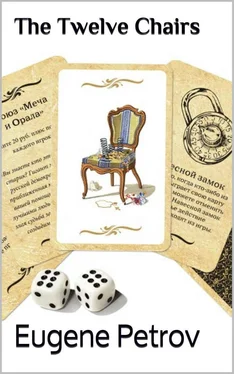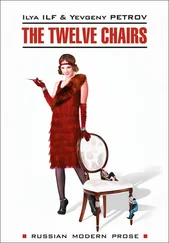Eugene Petrov - The Twelve Chairs
Здесь есть возможность читать онлайн «Eugene Petrov - The Twelve Chairs» весь текст электронной книги совершенно бесплатно (целиком полную версию без сокращений). В некоторых случаях можно слушать аудио, скачать через торрент в формате fb2 и присутствует краткое содержание. Год выпуска: 2013, Жанр: Юмористическая проза, на английском языке. Описание произведения, (предисловие) а так же отзывы посетителей доступны на портале библиотеки ЛибКат.
- Название:The Twelve Chairs
- Автор:
- Жанр:
- Год:2013
- ISBN:нет данных
- Рейтинг книги:5 / 5. Голосов: 1
-
Избранное:Добавить в избранное
- Отзывы:
-
Ваша оценка:
- 100
- 1
- 2
- 3
- 4
- 5
The Twelve Chairs: краткое содержание, описание и аннотация
Предлагаем к чтению аннотацию, описание, краткое содержание или предисловие (зависит от того, что написал сам автор книги «The Twelve Chairs»). Если вы не нашли необходимую информацию о книге — напишите в комментариях, мы постараемся отыскать её.
Find traces of a separate headset difficult and heroes face different adventures and troubles.
The Twelve Chairs — читать онлайн бесплатно полную книгу (весь текст) целиком
Ниже представлен текст книги, разбитый по страницам. Система сохранения места последней прочитанной страницы, позволяет с удобством читать онлайн бесплатно книгу «The Twelve Chairs», без необходимости каждый раз заново искать на чём Вы остановились. Поставьте закладку, и сможете в любой момент перейти на страницу, на которой закончили чтение.
Интервал:
Закладка:
divans, pouffes, chandeliers . . . even dinner services."
"Well," said Ostap, "they ought to erect a monument to you. But let's
get to the point. The letter V, for example."
"The letter V it is," responded Korobeinikov willingly. "In one moment.
Vm, Vn. Vorotsky, no. 48238, Vorobyaninov. Ippolit Matveyevich, your father,
God rest his soul, was a man with a big heart. . . A Baecker piano, no.
54809. Chinese vases, marked, four, from Sevres in France; Aubusson carpets,
eight, different sizes; a tapestry, "The Shepherd Boy'; a tapestry, 'The
Shepherd Girl'; Tekke carpets, two; Khorassan carpets, one; stuffed bears
with dish, one; a bedroom suite to seat twelve; a dining-room suite to seat
sixteen; a drawing-room suite to seat twelve, walnut, made by Hambs."
"And who was given it?" asked Ostap impatiently. "We're just coming to
that. The stuffed bear with dish went to the police station No. 2. The
Shepherd Boy tapestry went to the art treasure collection; the Shepherd Girl
tapestry to the water-transport club; the Aubusson, Tekke and Khorassan
carpets to the Ministry of Foreign Trade. The bedroom suite went to the
hunters' trade-union; the dining-room suite to the Stargorod branch of the
chief tea administration. The walnut suite was divided up. The round table
and one chair went to the pensioners' home, a curved-back settee was given
to the housing division (it's still in the hall, and the bastards spilled
grease all over the covering); one chair went to Comrade Gritsatsuyev as an
imperialist war invalid, at his own request, granted by Comrade Burkin, head
of the housing division. Ten chairs went to Moscow to the furniture museum,
in accordance with a circular sent round by the Ministry of Education . . .
Chinese vases, marked .. ."
"Well done!" said Ostap jubilantly. "That's more like it! Now it would
be nice to see the actual orders."
"In a moment. We'll come to the orders in a moment. Letter V, No.
48238."
The old man went up to the cupboard and, standing on tiptoe, took down
the appropriate bundle.
"Here you are. All your father's furniture. Do you want all the
orders?"
"What would I do with all of them? Just something to remind me of my
childhood. The drawing-room suite . . . I remember how I used to play on the
Khorassan carpet in the drawing-room, looking at the Shepherd Boy tapestry .
. . I had a fine time, a wonderful childhood. So let's stick to the
drawing-room suite, dad."
Lovingly the old man began to open up the bundle of green counterfoils
and searched for the orders in question. He took out five of them. One was
for ten chairs, two for one chair each, one for the round table, and one for
tapestry.
"lust see. They're all in order. You know where each item is. All the
counterfoils have the addresses on them and also the receiver's own
signature. So no one can back out if anything happens. Perhaps you'd like
Madame Popov's furniture? It's very good and also made by Hambs."
But Ostap was motivated solely by love for his parents; he grabbed the
orders, stuffed them in the depths of his pocket and declined the furniture
belonging to General Popov's wife.
"May I make out a receipt?" inquired the record-keeper, adroitly
arching himself.
"You may," said Ostap amiably. "Make it out, champion of an idea!"
"I will then."
"Do that!"
They went back into the first room. Korobeinikov made out a receipt in
neat handwriting and handed it smilingly to his visitor. The chief
concessionaire took the piece of paper with two fingers of his right hand in
a singularly courteous manner and put it in the same pocket as the precious
orders.
"Well, so long for now," he said, squinting. "I think I've given you a
lot of trouble. I won't burden you any more with my presence. Good-bye, king
of the office!"
The dumb-founded record-keeper limply took the offered hand.
"Good-bye!" repeated Ostap.
He moved towards the door.
Korobeinikov was at a loss to understand. He even looked on the table
to see if the visitor had left any money there. Then he asked very quietly:
"What about the money?"
"What money?" said Ostap, opening the door. "Did I hear you say
something about money? "
"Of course! For the furniture; for the orders!"
"Honestly, chum," crooned Ostap, "I swear by my late father, I'd be
glad to, but I haven't any; I forgot to draw any from my current account."
The old man began to tremble and put out a puny hand to restrain his
nocturnal visitor.
"Don't be a fool," said Ostap menacingly. "I'm telling you in plain
Russian-tomorrow means tomorrow. So long! Write to me!"
The door slammed. Korobeinikov opened it and ran into the street, but
Ostap had gone. He was soon on his way past the bridge. A locomotive passing
overhead illuminated him with its lights and covered him with smoke.
"Things are moving," cried Ostap to the driver, "things are moving,
gentlemen of the jury!"
The driver could not hear; he waved his hand, and the wheels of the
locomotive began pulling the steel elbows of the cranks with still greater
force. The locomotive raced away.
Korobeinikov stood for a few moments in the icy wind and then went back
into his hovel, cursing like a trooper. He stopped in the middle of the room
and kicked the table with rage. The clog-shaped ash-tray with the word
"Triangle" on it jumped up and down, and the glass clinked against the
decanter.
Never before had Bartholomew Korobeinikov been so wretchedly deceived.
He could deceive anyone he liked, but this time he had been fooled with such
brilliant simplicity that all he could do was stand for some time, lashing
out at the thick legs of the table.
In Gusishe, Korobeinikov was known as Bartholomeich. People only turned
to him in cases of extreme need. He acted as a pawnbroker and charged
cannibalistic rates of interest. He had been doing this for several years
and had never once been caught. But now he had been cheated at his own game,
a business from which he expected great profits and a secure old age.
"A fine thing!" he cried, remembering the lost orders. "From now on
money in advance. How could I have bungled it like that? I gave him the
walnut suite with my own hands. The Shepherd Boy alone is priceless. Done by
hand. . . ."
An uncertain hand had been ringing the bell marked "Please Ring" for
some time and Korobeinikov hardly had time to remember that the outside door
was still open, when there was a heavy thud, and' the voice of a man
entangled in a maze of cupboards called out:
"How do I get in?"
Korobeinikov went into the hallway, took hold of somebody's coat (it
felt like coarse cloth), and pulled Father Theodore into the dining-room.
"I humbly apologize," said Father Theodore.
After ten minutes of innuendoes and sly remarks on both sides, it came
to light that Citizen Korobeinikov definitely had some information regarding
Vorobyaninov's furniture and that Father Theodore was not averse to paying
for it. Furthermore, to the record-keeper's great amusement, the visitor
turned out to be the late marshal's own brother, and passionately desired to
keep something in memory of him, for example, a walnut drawing-room suite.
The suite had very happy boyhood associations for Vorobyaninov's brother.
Korobeinikov asked a hundred roubles. The visitor rated his brother's
memory considerably lower than that, say thirty roubles. They agreed on
Читать дальшеИнтервал:
Закладка:
Похожие книги на «The Twelve Chairs»
Представляем Вашему вниманию похожие книги на «The Twelve Chairs» списком для выбора. Мы отобрали схожую по названию и смыслу литературу в надежде предоставить читателям больше вариантов отыскать новые, интересные, ещё непрочитанные произведения.
Обсуждение, отзывы о книге «The Twelve Chairs» и просто собственные мнения читателей. Оставьте ваши комментарии, напишите, что Вы думаете о произведении, его смысле или главных героях. Укажите что конкретно понравилось, а что нет, и почему Вы так считаете.












